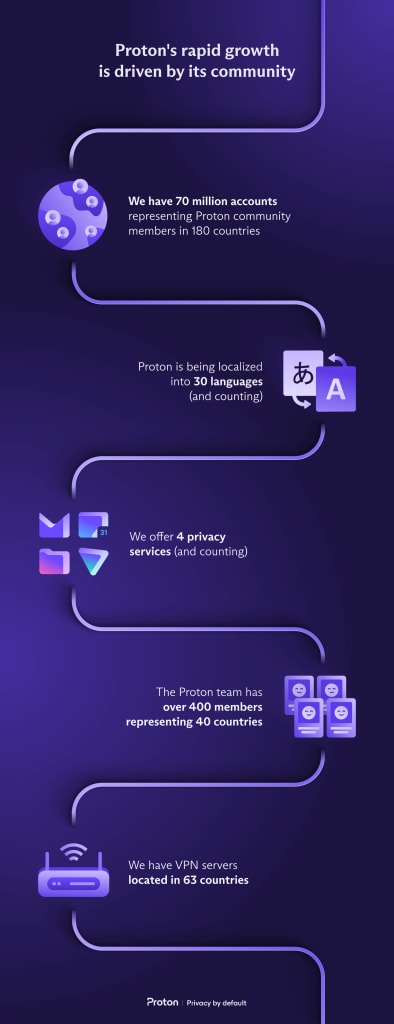En 2010, Mark Zuckerberg a rejeté la vie privée comme une norme sociale ayant perdu de sa pertinence. Heureusement pour nous tous, il avait tort. Au cours des 12 dernières années, la vie privée a connu une renaissance. Les citoyens exigent le respect de leur vie privée, les décideurs politiques adoptent désormais des lois pour rendre les marchés numériques compétitifs, et même les géants de la tech font (souvent de manière douteuse) des revendications en matière de confidentialité.

Il semble maintenant que l’internet du futur sera plus privé, ce qui est déjà un constat en soi. Une grande partie de cela peut être attribuée à la communauté Proton. En adoptant des technologies privilégiant la confidentialité par défaut, nous montrons au monde que la vie privée est importante et qu’il est viable de construire un internet alternatif axé sur la confidentialité.
Récemment, Proton a dépassé les 70 millions de comptes utilisateurs, démontrant l’intérêt général pour les technologies privilégiant d’abord la confidentialité, qui sont meilleures pour les utilisateurs et la société. Votre soutien a permis à Proton Mail de devenir le plus grand service de boite mail sécurisée(nouvelle fenêtre) au monde et à Proton VPN de devenir le service de VPN gratuit(nouvelle fenêtre) le plus utilisé dans de nombreux pays à travers le monde, en particulier dans des endroits où la liberté d’information est la plus nécessaire, comme en Russie. Le meilleur dans tout cela, c’est que nous avons pu le faire tout en préservant les valeurs originelles de Proton depuis nos premiers jours de financement participatif. Proton reste gratuit, open source, neutre, indépendant, et orienté communauté. Votre soutien est essentiel pour protéger les valeurs de Proton car il nous a permis de grandir jusqu’à une équipe de plus de 400 personnes pouvant mieux vous servir tout en restant financièrement viables.
Grâce à votre soutien, notre travail continue. Il n’est pas facile de construire un internet alternatif qui privilégie la confidentialité et offre une alternative aux services proposés par les géants de la tech qui privilégient les profits. Mais notre parcours jusqu’à présent montre que ce n’est pas impossible, et nous sommes impatients de continuer à construire un internet libre, ouvert et privé avec vous tous.





